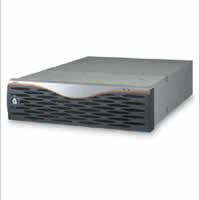NEC S2500 Storage Array
NEC Updated: 2008-04-14 RSS
NEC's S2500 Storage Array is a mid-range model positioned for the medium sized business providing additional capacity, IOPS, and throughput to handle a greater number of hosts and larger storage requirements. Additional support for mixed SATA/FC configuration meets the demands of differing quality of service requirements. The S2500 supports four high speed 4Gbps host connections, high-performance RAID processors, and inter-controller communication at 4Gbps.
As your business needs grow, the S2500 meets the demand with up to an additional 7 disk enclosures which can be connected to provide a maximum of 48TB with 120 disk drives. RAID-6 technology is included to ensure continued operation even if errors occur in two hard disks at the same time. This technology greatly enhances the availability of the disk array and can be used together with other storage pools such as RAID-1 and RAID-5.
High-Performance RAID Processors
High-performance ASIC RAID processors enable inter-controller communication at 4Gbps which utilizes shared memory. These features not only enhance the performance of the system, but helps with dynamic load balancing of the host interfaces. The switch-based disk enclosures allow for high-speed access to the disk drives being used.
Standard Four FC Host Ports, Four Gbps Each
Up to two servers with dual paths can be connected without an FC switch, enabling a simple and low-cost configuration. For larger configurations, one to two fabric switches are installed between the storage device and host systems.
Component Redundancy
Redundancy with field-replaceable, hot-swapping is provided for all major components such as controllers, cache memory, power supplies, battery backup units, and fans - insuring business up-time even in the rare event of a component failure.
RAID-6 Technology
RAID-6 technology ensures continued operation even if errors occur in two hard drives at the same time. RAID-6 greatly enhances the availability of the disk array, and can be used together with RAID-1 and RAID-5 storage pools. RAID-6 records two parity values, P and Q, which are generated by two independent equations made from the data. NEC's S2500 Storage Array contains a new ASIC LSI RAID processor, which carries out the complex RAID operations. RAID-6 provides high performance and keeps the device highly reliable.
DynamicPool
Traditionally, logical disks could only be managed in units of the physical sets of disks that made up the RAID, users had to install a fixed number of disks even if they were not necessary. The new dynamic pool function permits logical disk capacities to be changed dynamically. Physical disks can be added one at a time. The logical disks required can be managed efficiently, and the system is free from physical restrictions.
Phoenix Technology for Advanced Preventative Maintenance
Using Phoenix Technology, a disk drive causing a delay in response can be separated from the RAID pool, and a background diagnosis automatically performed. If no defects are found, the drive can be returned to the original RAID configuration without the need for switching to a hot spare disk.
73 GB FC (15,000 rpm)
147 GB FC (10,000 rpm and 15,000 rpm)
300 GB FC (10,000 rpm)
500 GB SATA (7,200 rpm)
In addition, the S2500 Storage Array has dual controllers, supports SATA 500GB drives and can be intermixed with FC drives within the same array. RAID-1, RAID-5, RAID-10, RAID-50, and RAID-6 can be installed in mixed configurations. Four host FC ports are built-in as a standard. A maximum of 7 additional disk enclosures, each capable of mounting 15 disk drives can be connected to equate to 120 HDD. The S2500 Storage Array can support 2 GB to 4 GB of cache per controller, for a total of up to 8 GB of cache memory.
StorageManager
StorageManager is the integrated storage software package that provides basic control to NEC's S2500 Storage Array. This software features GUI display for the configuration, monitoring, error reporting, and performance information on logical disks and controllers.
AccessControl (optional)
Access to the logical disks can be set for individual ports or hosts (LUN masking).
PerformanceMonitor (optional)
Includes real-time status of information on the array's performance, load monitoring, and statistical analysis.
ReplicationSuite (DDR+DSV) (optional)
DDR or Dynamic Data Replication provides for full copies of LUNs. Generally these copies are fractured and re-assigned to other connected hosts for such needs as batch processing, testing with production data, or even parallel backup. DSV or Dynamic Snap Volume provides for a copy of the changed data between two points in time (PIT). This technology facilitates advanced recovery of data from up to 16 earlier states without the need to locate and search through traditional tape medium. Since only the changed data is written, cost savings is realized over the full copy methodology.
Remote Data Replication (optional)
Replicates business volumes defined for each logical disk, enabling use of replicated data at a remote site.
Quick Setup Guide - 201 KB PDF
Users Guide - 3846 KB PDF
Datasheet - 5633 KB PDF
Related Manuals
NEC S1500 Storage Array
NEC S2900 Storage Array
HP StorageWorks MSL6000 Tape Libraries
HP StorageWorks MSL8096 Tape Library
HP StorageWorks MSL4048 Tape Library
HP StorageWorks MSL2024 Tape Library
HP StorageWorks ESL E-Series Tape Libraries
HP StorageWorks EML E-Series Tape Libraries
HP StorageWorks 1/8 G2 Tape Autoloader
HP StorageWorks DAT 72x10 Tape Autoloader
HP StorageWorks DAT 160 SCSI Tape Drive
HP StorageWorks DAT 160 SAS Tape Drive